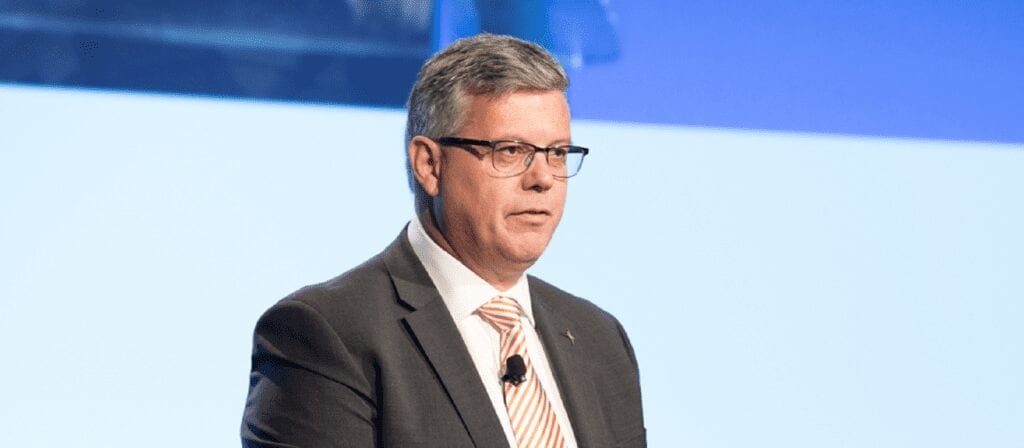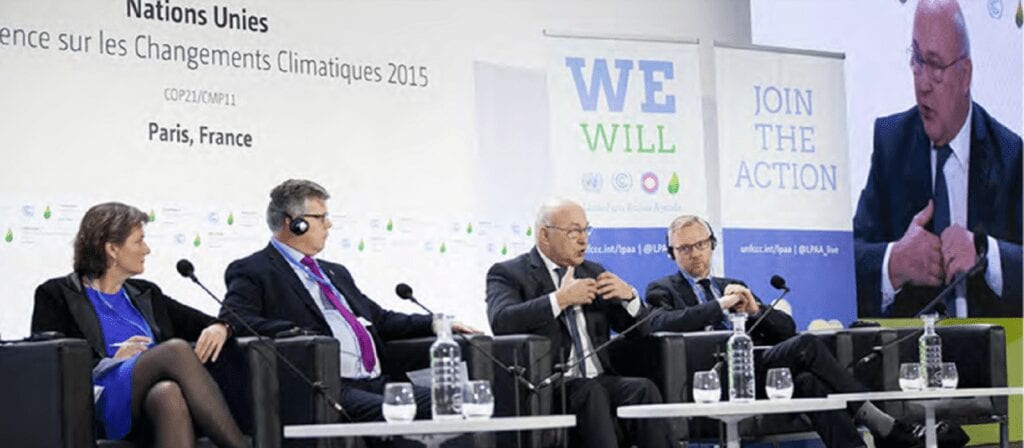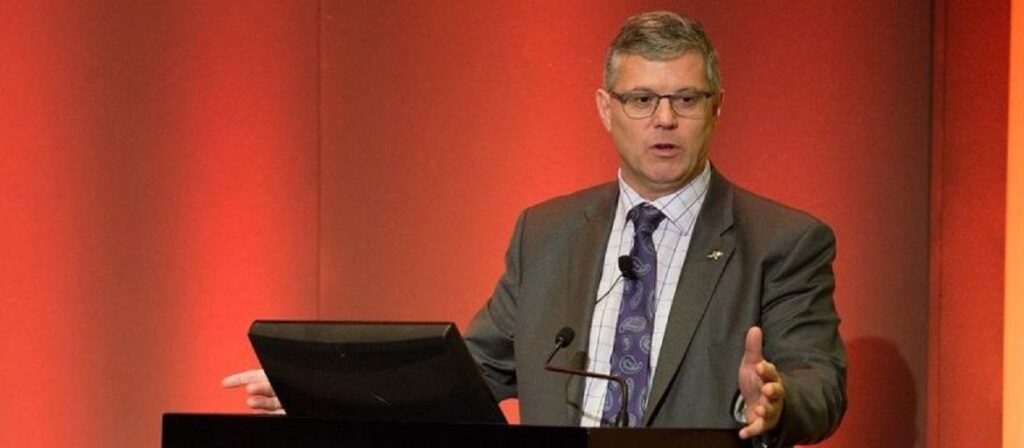The Climate Change Summit (COP21) in Paris has indeed been a landmark event for the insurance sector, for the International Cooperative and Mutual Insurance Federation (ICMIF) and our members. Not only were the several initiatives I will share with you below received with great enthusiasm by those present but we were also able to announce them in speeches which took place on the most significant stages of the COP21 Conference. Our sector therefore enjoyed an extremely high profile. It was indeed an historic few days, which is why I wanted to share this with you all now.
The insurance sector is one of the largest industries in the world. With 6% of the global GDP; annual premium income of USD 5 trillion and assets of USD 35 trillion, insurance is a very significant sector in terms of growth, jobs and investment. The USD 35 trillion of assets held by the insurance sector represents about one third of total global investable assets.
The mutual and cooperative insurance sector represents around one third of the total market with 40% market share in countries such as USA, Japan, France and Germany.
On the opening day of COP21, Monday 30 November, Mike McGavick, CEO of XLCatlin and Chairman of the Board of The Geneva Association gave a speech on behalf of ICMIF, the International Insurance Society (IIS) and the Geneva Association. These three global organizations, combined, represent the majority of insurers worldwide. McGavick told delegates that insurers are already significantly engaged in the climate change debate and, on behalf of the insurance industry, he welcomed the launch of the UN Secretary-General’s Climate Resilience Initiative — with its three areas of focus: Anticipate, Absorb, Reshape (A2R).
The A2R initiative is a natural fit for insurers as we are specialists in risk identification, risk prevention, risk mitigation and post-event recovery. We are already partnering with governments and civil society in many areas to help make societies more resilient to climate change.
The success of the A2R initiative will depend on the delivery of a number of other global, industry related initiatives. It was my great honour on Friday 4 December to have the opportunity to outline just some of the initiatives that the insurance sector is undertaking to support the COP21 agenda and in particular Ban Ki-moon’s Climate Resilience Initiative. This opportunity came thanks to my participation in the COP21/Lima-Paris Action (LPAA); Private Finance Action Session. The session was opened by Janos Pasztor, UN Assistant Secretary-General for Climate Change, and Michel Sapin, the French Finance Minister; with my fellow panellists representing sections of financial services – Martin Skancke, Chair, Advisory Council of the Principles for Responsible investment; Karien van Gennip, member of UNEP FI banking group and CEO, ING Bank France; and Erik Jan van Bergen, Green Bond Principles executive committee and Actiam’s CIO.
Firstly, we looked at how insurers Anticipate. The insurance sector understands the risks associated with climate change and can model their potential impact. This is at the very heart of creating resilience. Risk modelling is essential for managing risk, investing in resilience and underpinning insurance development. Insurers have transformed their resilience this way over the last two decades and these techniques should be widely adopted. Our objective is global coverage and inclusive access to these essential tools. This will, in turn, lead to resilient building codes and land use practises helping to further mitigate risk and build more resilient communities and cities.
This session was the perfect opportunity for me to announce that the insurance sector has brought together public and academic communities to support this aspiration via a global Resilience Modelling and Mapping Forum which will include the World Bank, the Global Facility for Disaster Reduction and Recovery (GFDRR), the United Nations Office for Disaster Risk Reduction (UNISDR) and governments. Last month the Willis Group committed USD 1m to support its preparation and other commitments will follow.
The second area of focus in Ban Ki-moons’ new initiative is Absorb. In our terms this means increasing the penetration of insurance. Too few disasters are covered by insurance, Swiss Re has estimated that 75% of natural disasters that affect people’s lives and livelihoods are not covered by insurance. Effective risk transfer schemes to deal with extreme events have already been set up by the insurance industry in partnership with governments such as the African Risk Capacity and the Caribbean Catastrophe Risk Insurance Facility.
Raising people’s standard of living and giving them security of life and protection of property is vital to create jobs and growth and is a basic requirement of the Sustainable Development Goals (SDGs). Hence the announcement came from the G7 of their InsuResilience initiative earlier this year which aims to protect an additional 400 million of the poorest people from natural disasters is crucial to delivering global growth. The G7 commitment is split with 300 million people being protected by government schemes and 100 million expected from the business sector. I was therefore delighted to be able to announce a new initiative from ICMIF and the mutual sector during the session, the 5-5-5 Mutual Microinsurance Strategy.
Our 5-5-5 Strategy aims to protect 25 million more people in the poorest areas by 2020, which is 25% of the G7 business sector commitment. We will be targeting 5 million low income households, in five countries, over five years. With the security of protection from disasters people can create jobs and long-term, sustainable growth for communities that need it the most.
We will work with United Nations Development Programme (UNDP), the Organisation for Economic Co-operation and Development (OECD), the Office for the Coordination of Humanitarian Affairs (OCHA), regulators and governments, including the V20 group of vulnerable countries, to close the resilience gap and to protect lives and livelihoods.
The third area of focus of the Secretary General’s initiative is to Reshape business practices to protect natural resources and increase resilience in infrastructure.
Projects which will help to fund this work include the Smart-Risk investing initiative. In a 2013 World Bank report titled ‘Insurers as Partners in Inclusive Green Growth’ the sector was reported as having USD 42 billion invested in Green Finance. In my speech at the UN Climate Change Summit in September 2014, ICMIF and the IIS set targets to:
- Double the USD 42 billion investment in green finance to USD 84 billion by end of 2015
- Increase this by tenfold to USD 420 billion by 2020
- Redefine ‘green finance’ as ‘Smart Risk investing’ to bring in all investible assets classes and overlay the risk management knowledge from the underwriting side to asset side of the balance sheet.
- Provide a framework for insurance sector asset managers around smart risk investing and change the culture towards long-term risk management.
I was delighted that during the Private Finance Climate Session at COP21 I was able to announce that the first of these objectives has already been met. A select number of members of ICMIF and the IIS, those that are industry champions in this area, have already collectively invested USD 109 billion in Smart Risk investing. So we have exceeded the first target set!
The next phase of defining Smart Risk investments; providing a framework for all asset classes; and changing the behaviour of the asset managers in insurance is under way. We are in the process of establishing a high level advisory panel to lead the next phase starting in January 2016.
This advisory panel will apply the knowledge that the underwriting side of the industry has in relation to risk and modelling to the investible asset side of the business. Thereby driving smarter investment decisions and embedding resilience into investments. The framework and definition will embody the UN frameworks agreed in 2015, including the Sendai agreement on disaster risk and resilience, the SDGs and the climate change agreement agreed this week.
The B20 set up the Global Infrastructure Hub last year as a meeting place where infrastructure projects and infrastructure investors can come together. ICMIF is working on an initiative that can bring the concept to life through a natural fit where stakeholders and society values can combine to produce infrastructure projects that embody the above frameworks. These long-term investments need to have long-term patient capital with long-term sustainable rewards which the mutual sector can provide.
We must create more resilient societies, businesses and institutions. We support the G20 Financial Stability Board’s industry-led agenda to consider climate risk disclosure across the wider economy. Climate risk disclosure has played a key part in our hard-won journey towards greater resilience and there are important lessons to share and we look forward to supporting the FSB’s initiative in this area through to the G20 Summit in China next year. The announcement by Mark Carney, Chair of the FSB, that Michael Bloomberg would Chair the Task Force on Climate-related Financial Disclosures (TCFD) was very welcomed by the insurance industry representatives.
Bringing the three areas of the new A2R initiative together will be the newly formed Insurance Development Forum. The forum will be made up of leading figures from the insurance industry, government, civil society and international institutions which will have the unifying mission to ‘Understand risk and to create resilient platforms for sustainable growth and human dignity.’
These varied initiatives undertaken by the insurance industry demonstrate our serious and wholehearted commitment to playing our part in the climate change debate and in providing solutions that are practical and properly funded. Solutions that the business world can accept, and has in many cases accepted, as the new paradigm in the business world. These are not just political statements but real initiatives with real outcomes that can make a real difference.






